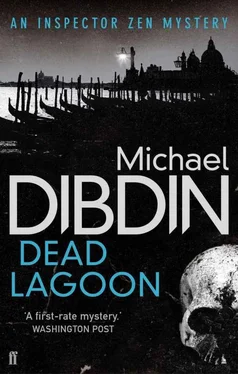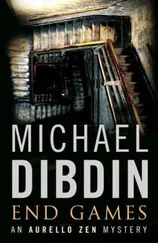Michael Dibdin - Dead Lagoon
Здесь есть возможность читать онлайн «Michael Dibdin - Dead Lagoon» весь текст электронной книги совершенно бесплатно (целиком полную версию без сокращений). В некоторых случаях можно слушать аудио, скачать через торрент в формате fb2 и присутствует краткое содержание. Жанр: Полицейский детектив, на английском языке. Описание произведения, (предисловие) а так же отзывы посетителей доступны на портале библиотеки ЛибКат.
- Название:Dead Lagoon
- Автор:
- Жанр:
- Год:неизвестен
- ISBN:нет данных
- Рейтинг книги:5 / 5. Голосов: 1
-
Избранное:Добавить в избранное
- Отзывы:
-
Ваша оценка:
- 100
- 1
- 2
- 3
- 4
- 5
Dead Lagoon: краткое содержание, описание и аннотация
Предлагаем к чтению аннотацию, описание, краткое содержание или предисловие (зависит от того, что написал сам автор книги «Dead Lagoon»). Если вы не нашли необходимую информацию о книге — напишите в комментариях, мы постараемся отыскать её.
Dead Lagoon — читать онлайн бесплатно полную книгу (весь текст) целиком
Ниже представлен текст книги, разбитый по страницам. Система сохранения места последней прочитанной страницы, позволяет с удобством читать онлайн бесплатно книгу «Dead Lagoon», без необходимости каждый раз заново искать на чём Вы остановились. Поставьте закладку, и сможете в любой момент перейти на страницу, на которой закончили чтение.
Интервал:
Закладка:
Zen started to run, not in the direction Saoner had taken, but straight ahead, through the tiny Campo delle Beccarie, across the angled bridge and along the alley beyond. If he did not find Saoner in the next few seconds it would be too late, as the number of variables became so great that a solution would be impossible.
On reaching the first of the two alleys his quarry could have taken, he stopped dead, listening intently. Apart from the distant lapping of water, all was still. Zen’s eyes narrowed. He ran over his mental map again, satisfying himself that there were no other exits. The alley in which he was standing was lined with an unbroken succession of houses on either side. Zen crossed it and walked quickly to the next intersection.
In this street there were three openings, all to the left. Zen moved as quietly as he could to the first entrance and peered round the corner. This proved to be a short blind alley cut off at the next canal. He went on to the next opening, whose nameplate showed it to be the entrance to a courtyard behind the large palazzo which faced the street. Inside, all was dark. Zen took a hundred-lire coin from his pocket and tossed it into the passage, where it tinkled resoundingly. Seconds later, Tommaso Saoner scurried out of the other entrance and ran straight into Zen.
At first he made to turn back, then changed his mind and strode past without a word or a flicker of expression. Zen fell in behind him, keeping closer than before. The two men moved steadily through the fan tracery of alleys and canals centred on San Giacomo dell’Orio. A searchlight suddenly appeared in the darkness ahead, swinging this way and that like a stick. A moment later, a watertaxi rounded the corner and came burbling past them. As the noise subsided, a church bell struck midnight. Zen smiled grimly at this signal that his official tenure in the city was at an end. If his opponents had counted on him meekly packing his bags and going when told to go, they had seriously miscalculated. He felt a weight lift from his shoulders as the twelve ponderous chimes cut through the red tape and procedural minutiae in which he had been enmeshed. As a free agent, he was much more dangerous and effective than he could have been in his official capacity.
They eventually emerged on to the open quay opposite the long low facade of the railway station, where Saoner suddenly broke into a run. For the first hundred metres or so Zen managed to keep pace, but after that Saoner began to pull ahead. He leapt up the steps of the high bridge across the Rio Nuovo and disappeared, heading towards Piazzale Roma. When Zen reached the top of the bridge he had to pause for breath. Too much desk work had taken its toll of his physique. Nevertheless he forced himself to carry on, even though he now knew that he would be too late. He could already hear the engine of a waiting taxi ticking over to keep the driver warm. By the time he reached the rank, Saoner would be out of reach, roaring off across the Ponte della Liberta in some plush Volvo or Mercedes, having neatly escaped the psychological trap which Zen had prepared for him.
A short flight of steps lined with dingy bushes led up from the vaporetto landing-stage to the bare expanse of asphalt marked with lanes for buses and cars. At the far end, the neon sign of the multi-storey car park glimmered eerily. The entire place was deserted. A moment later, Zen realized that the engine he had been hearing was one of the water buses which maintained a skeleton service throughout the night. It grew to a roar as the skipper reversed the engines to hold the vaporetto in against the pier. Three young men disembarked and headed off, laughing and talking loudly, towards the car park. The deck-hand had already closed the gate and begun to cast off when a figure emerged from the bushes lining the steps and ran towards the boat. The gate slid open again and the man jumped aboard as the vessel started to move away from the landing-stage.
Zen sprinted for the steps, yelling to the deck-hand to wait, but his voice went unheard above the clamour of the engine. The gap between the bows and the quay opened rapidly as the skipper put the helm over, heading out into the wide basin between the car park and the railway station on the other bank. Zen ran straight down the pier and was just in time to leap on to the stern as it passed by. The deck-hand had disappeared into the wheelhouse at the other end of the cabin housing.
The whole craft lurched as the swell in the main channel caught it side on. Zen hung on grimly to the outside of the guard-rails aft as the propellers just below his feet thrashed the water until it foamed like spumante. Then a darkened figure appeared, silhouetted against the double glass doors of the cabin. The door opened and Tommaso Saoner stepped out on to the sunken afterdeck. Zen put his foot on the lower rail and started to clamber over, but he was still balanced precariously on the sloping grid of slippery metal when Saoner reached him, stretched out his hand and helped him to climb inboard.
Zen collapsed on one of the red plastic seats in the stern. He looked up at Saoner, nodding.
‘You see, Tommaso? You’d like to be ruthless and dashing like your hero Dal Maschio, but you’re not. You’re weak and decent. Dal Maschio would have pushed me in without a second thought, and left me to drown or be sliced up by the propellers. You couldn’t bring yourself to do that, but you still think you can run with the people who can, and have, and will.’
Saoner looked at him emptily, then turned away and walked back into the deserted cabin. Zen lit a cigarette with trembling hands, sheltering the flame against the wind as the boat turned out of the main channel, under a series of wide metal and concrete bridges and out into a broad canal running between a railway marshalling yard and the port area. The deck-hand appeared at the top of the companion-way leading up from the cabin.
‘Anyone for Santa Marta?’ he called.
Saoner stood up. There was a bump as the boat went alongside. Zen threw away his cigarette and followed Saoner ashore. Santa Marta was a bleak area, one of the new quarters built on reclaimed land at the turn of the century. Disused railway tracks ran between the hulks of salvaged boats propped up on concrete blocks. In the distance were redbrick blocks of flats, built to house the dockyard workers.
Blinding lights razored through the darkness and a speeding bulk flashed past with a blare of noise, missing Zen by a whisker. The experience seemed so utterly abnormal that for a moment he thought wildly of aliens in flying saucers and the like. It was several moments before he recovered enough to notice that the stretch of ground he had been crossing was a road providing vehicular access to the port area. He located the receding figure of Tommaso Saoner and started after him, smiling ruefully. He had not only come within an ace of being killed, but in a way that would have ensured that his name would always bring a smile to everyone’s lips. Aurelio Zen, the man who got run over in Venice.
On the graceful stone arch across the Arzere canal, Saoner paused briefly, perhaps uncertain which direction to take, or momentarily perturbed by the sight of the prison complex a little further along the canal. The reflection of the streetlamps rolled gently on the trace of swell carried in from the open waters of the lagoon. At the corner opposite, a man dressed in pyjamas was closing the green shutters of his bedroom window. He paused to stare at Saoner, who promptly turned right and set off at a cracking pace, as though he had decided upon a destination and was eager to arrive. But this appearance of purpose and urgency was contradicted by the circuitous course he took, weaving this way and that, first towards Campo Santa Margherita — where Zen closed up, fearing that he might try and rouse some of his NRV colleagues from their beds — and then east towards the Rio Nuovo, before finally doubling back by way of the gaunt church of Angelo Raffaele to emerge on the windswept shore of the Zattere.
Читать дальшеИнтервал:
Закладка:
Похожие книги на «Dead Lagoon»
Представляем Вашему вниманию похожие книги на «Dead Lagoon» списком для выбора. Мы отобрали схожую по названию и смыслу литературу в надежде предоставить читателям больше вариантов отыскать новые, интересные, ещё непрочитанные произведения.
Обсуждение, отзывы о книге «Dead Lagoon» и просто собственные мнения читателей. Оставьте ваши комментарии, напишите, что Вы думаете о произведении, его смысле или главных героях. Укажите что конкретно понравилось, а что нет, и почему Вы так считаете.











